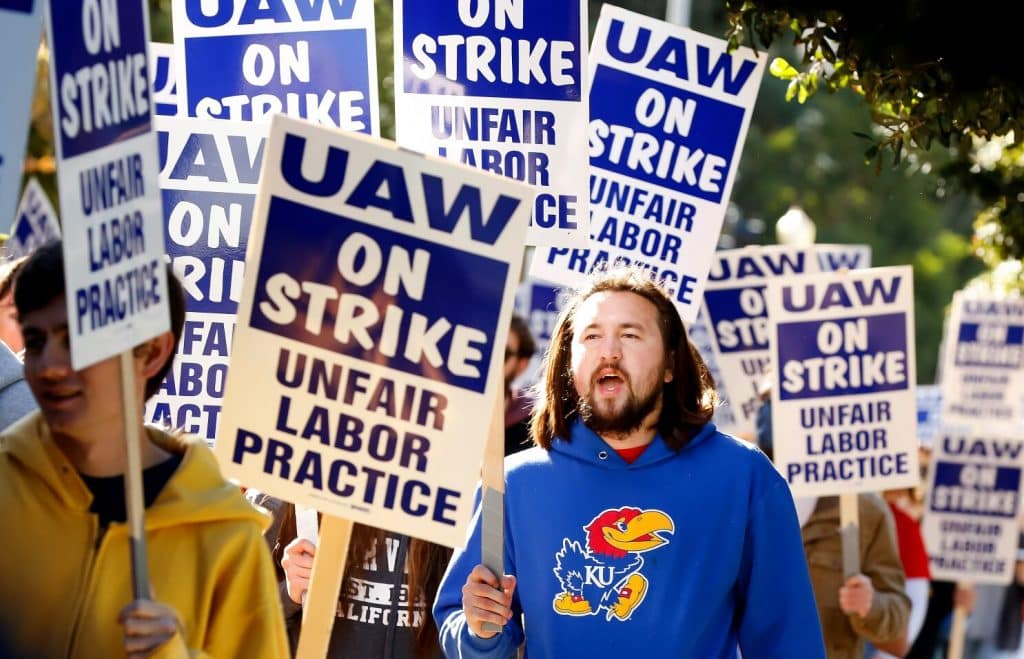As of Monday, 48,000 academic workers at the University of California have gone on strike, fighting for better wages and childcare support, as well as the removal of fees for international scholars, public transit passes, and better protection against bullying and harassment. This is the largest higher-education strike in U.S. history, the largest strike of the year in the U.S., and a pivotal moment for organizers in higher education.
These workers are academic researchers, teaching assistants, graduate student researchers and instructors, and postdoctoral researchers, across nine campuses of one of the world’s most prestigious university systems. The University of California relies on these workers for most of its teaching and research, yet it severely underpays them. Graduate students make on average $24,000 a year while working in areas of the country (such as Los Angeles, Orange County, Santa Cruz, or the Bay Area) with exorbitant housing costs.
As a result, most struggle to afford to live where they work, and many struggle with housing insecurity and homelessness while working at the UC. Over 90 percent of graduate workers and over 60 percent of postdocs are rent burdened, paying at least a third of their income on rent. This forces many into taking additional jobs simply to afford to live within commuting distance of work.
And even working additional jobs is barely enough: Anny Viloria Winnett, a graduate researcher in Community Health Sciences at UCLA, told me she spends about 70 percent of her income (from a university fellowship jointly with a research job) on rent for university-subsidized housing. Louise McClure, a teaching assistant and PhD candidate in English at UC Irvine, pays about half of her income in rent and is forced to live about an hour’s commute from the campus to find housing that she can afford at all.
And those with families can barely afford to pay for childcare, leading many to leave for other jobs. For instance, Stefan Zdraljevic, a postdoctoral researcher in genetics at UCLA, and his partner found the university’s childcare support so meager that it was more affordable for his partner to stop working to take care of their one-year old.
In light of this, workers are demanding higher wages ($54,000 for graduate students, $70,000 for postdocs) and a $2,000-a-month reimbursement for childcare, full tuition subsidies for UC childcare programs, and expanded options for paid family leave.
The university has shown itself unwilling to negotiate. It has counteroffered raises below inflation — otherwise known as pay cuts. It has also falsely claimed that graduate workers only work part-time, and that compensation is not tied to housing costs. And, on Tuesday, it refused to sit at the bargaining table with three of the four bargaining units.
Outside, across nine campuses, crowds of hundreds of workers are picketing, sharing their experiences, and building collective power. They know that they are driving the University of California to a halt by withholding their labor and that the university will have to negotiate.
The atmosphere is both joyous and angry. These are young workers who know that they deserve better and are willing to fight for it. They are part of a growing movement at universities, with graduate researchers and teaching assistants across the country organizing in unions and bargaining for better working conditions. Workers at NYU and Columbia won substantially improved contracts last year. And just last week, workers at the New School in New York have authorized a strike, and workers at the University of Kansas are currently preparing to vote to form a union.
Beyond that, these workers see their struggle as part of a larger struggle for workers’ rights in the U.S. and beyond. Representatives from nurses’ unions, domestic workers’ unions, and progressive elected officials have shown up at picket lines in solidarity and spoken at rallies. The Teamsters Union has authorized workers to not cross the picket line, cutting off the university’s access to deliveries. And many other workers are showing up at the picket lines. The strike is building new pathways of solidarity and collective power that will propel us into a fairer future.
If you want to support the strike and are close to a UC campus, you can join in picketing at every campus from 8 a.m. to 4 p.m. You can also donate to the strike fund or sign a community support letter.










